Mailiyoshimura
On this page, you find all documents, package deals, and flashcards offered by seller mailiyoshimura.
- 5
- 0
- 0
Community
- Followers
- Following
5 items
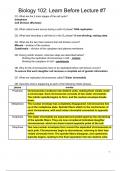
Biology 102 Chapter 6
Biology 102 Chapter 6: This chapter covers cell division, explaining the stages of the cell cycle (interphase and mitosis) and the processes of mitosis and meiosis. Mitosis creates two identical cells, while meiosis forms gametes with half the chromosome number, introducing genetic variation through crossing over and independent assortment. The chapter also discusses genetic inheritance, alleles, fertilization, and the regulation of the cell cycle, highlighting how mutations can cause cancer.
- Class notes
- • 10 pages •
Biology 102 Chapter 6: This chapter covers cell division, explaining the stages of the cell cycle (interphase and mitosis) and the processes of mitosis and meiosis. Mitosis creates two identical cells, while meiosis forms gametes with half the chromosome number, introducing genetic variation through crossing over and independent assortment. The chapter also discusses genetic inheritance, alleles, fertilization, and the regulation of the cell cycle, highlighting how mutations can cause cancer.
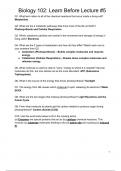
Biology 102 Chapter 5
Biology 102 Chapter 5: This chapter covers metabolism, the chemical reactions within cells that include photosynthesis and cellular respiration. Photosynthesis is an anabolic process that converts sunlight into glucose, while cellular respiration is a catabolic process that breaks down glucose to produce ATP, with byproducts of CO2 and H2O. ATP is the primary energy carrier in cells, fueling processes like active transport. Metabolic pathways are facilitated by enzymes, which catalyze reactions...
- Class notes
- • 9 pages •
Biology 102 Chapter 5: This chapter covers metabolism, the chemical reactions within cells that include photosynthesis and cellular respiration. Photosynthesis is an anabolic process that converts sunlight into glucose, while cellular respiration is a catabolic process that breaks down glucose to produce ATP, with byproducts of CO2 and H2O. ATP is the primary energy carrier in cells, fueling processes like active transport. Metabolic pathways are facilitated by enzymes, which catalyze reactions...
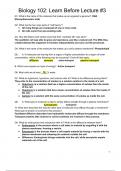
Biology 102 Chapter 4
Biology 102 Chapter 4: This chapter explains cell structure and function, focusing on the differences between prokaryotic (simpler, no organelles) and eukaryotic cells (complex, with organelles like the nucleus and mitochondria). It covers key cell components, including the plasma membrane, cytoplasm, and ribosomes, and processes like diffusion, osmosis, and active transport. The chapter also discusses organelles such as the endoplasmic reticulum, Golgi apparatus, lysosomes, and vacuoles, and e...
- Class notes
- • 6 pages •
Biology 102 Chapter 4: This chapter explains cell structure and function, focusing on the differences between prokaryotic (simpler, no organelles) and eukaryotic cells (complex, with organelles like the nucleus and mitochondria). It covers key cell components, including the plasma membrane, cytoplasm, and ribosomes, and processes like diffusion, osmosis, and active transport. The chapter also discusses organelles such as the endoplasmic reticulum, Golgi apparatus, lysosomes, and vacuoles, and e...
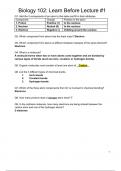
Biology 102 Chapter 3
Biology 102 Chapter 3: This chapter covers the chemistry behind life, including the structure of atoms and how molecules form through ionic, covalent, and hydrogen bonds. It highlights the four major biomolecules—proteins, carbohydrates, nucleic acids, and lipids—and their roles in living organisms. The chapter also explains water's role as a solvent, the differences between acids and bases, and the importance of pH in biological systems.
- Class notes
- • 7 pages •
Biology 102 Chapter 3: This chapter covers the chemistry behind life, including the structure of atoms and how molecules form through ionic, covalent, and hydrogen bonds. It highlights the four major biomolecules—proteins, carbohydrates, nucleic acids, and lipids—and their roles in living organisms. The chapter also explains water's role as a solvent, the differences between acids and bases, and the importance of pH in biological systems.
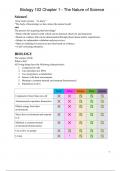
Biology 102 Chapter 1 & 2
Biology 102 - Chapters 1 & 2: These chapters introduce biology as the science of life, covering the shared characteristics of living organisms, the biological hierarchy, and the scientific method for acquiring knowledge. They also emphasize scientific literacy, the ability to understand and evaluate scientific claims by assessing credibility, identifying bias, and distinguishing real science from pseudoscience. The dangers of false claims, such as the vaccines and autism controversy, highlight ...
- Class notes
- • 8 pages •
Biology 102 - Chapters 1 & 2: These chapters introduce biology as the science of life, covering the shared characteristics of living organisms, the biological hierarchy, and the scientific method for acquiring knowledge. They also emphasize scientific literacy, the ability to understand and evaluate scientific claims by assessing credibility, identifying bias, and distinguishing real science from pseudoscience. The dangers of false claims, such as the vaccines and autism controversy, highlight ...
